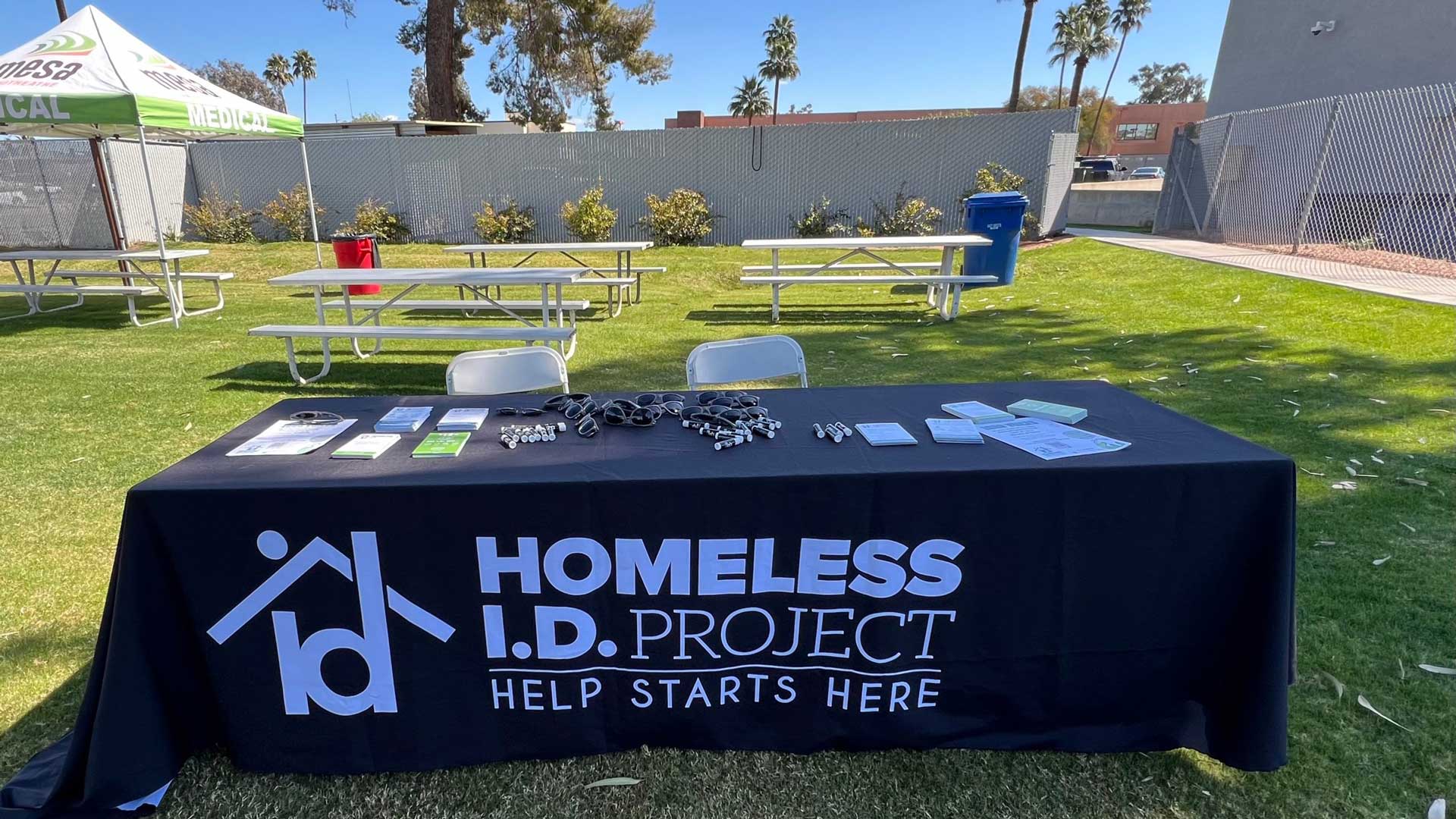 The Homeless ID Project aims to end homelessness by providing ID replacement services to eliminate barriers many unhoused individuals face to accessing housing, jobs, and essential services.
The Homeless ID Project aims to end homelessness by providing ID replacement services to eliminate barriers many unhoused individuals face to accessing housing, jobs, and essential services.
Arizona advocates are working to help get identification documents for those experiencing homelessness, aiming to eliminate the barriers faced by people seeking to regain stability and self-sufficiency. One step in that process is fighting to waive the fee to get a state identification card.
Experts say not being able to easily obtain licenses is a factor that can make it nearly impossible for people to escape the cycle of homelessness. Without an ID, it can be difficult or impossible to gain employment, secure housing, apply for food stamps, or access disability benefits.
It can even mean being denied access to federal, state, and county buildings, which often house social service agencies that assist people experiencing homelessness.
“Without an ID, there is no end to homelessness,” said Rick Mitchell, executive director of the Homeless ID Project. “There is no job. There’s no housing. There’s no opportunity for education. There’s no access to medical insurance. There’s no bank account. You can’t cash a check if you get a check. One of our clients famously said, ‘The only thing you can get without an ID is arrested.’”
The Homeless ID Project is on the Human Services Campus in Phoenix and has partnership programs across the Valley. The project aims to end homelessness through providing ID replacement services and to eliminate the barriers many face in obtaining identification documents.
“Our mission is to end homelessness by providing individuals with legally acceptable identification documents that they need to find employment, housing, and other basic services for those seeking to become self-sufficient,” Mitchell said.
Pre-pandemic, the Homeless ID Project was providing about 7,500 documents per year. But in 2023, the program saw a dramatic increase, assisting nearly 23,000 clients replace 15,622 documents, about two-thirds of those being state IDs.
According to the project’s 2023 annual community impact report, staff saw an average of 90 clients a day and provided around 60 documents daily. Mitchell said that clients reported a need for documents for a variety of reasons.
“The reason that people who come to us cite for needing an ID is that 70% of them are looking for housing, and they can’t get housing without an ID; 67% are looking for employment, and 39% are looking for medical insurance,” Mitchell said.
The program assists a wide variety of unhoused individuals in need of document retrieval, including people leaving jail or prison, those aging out of foster care, and those escaping domestic violence or trafficking situations.
“Forty to 50% of kids aging out of foster care become homeless or incarcerated within two years. People leaving jail or prison often leave jail or prison without an ID. If you leave jail or prison without an ID, you’re probably headed back to jail or prison,” Mitchell said. “All of those different elements of our population are subject to needing documents, and either not being able to get out of homelessness or actually becoming homeless is a result of missing these documents.”
The Phoenix Rescue Mission is an organization in the Valley focused on responding to police reports regarding unhoused individuals, to establish meaningful connections with them and to address the barriers they face in getting off the streets. Helping individuals access identification is a large part of what they do, according to Community Relationship Officer Pamela Morrison.
“That’s one of those issues that a lot of people on the street experience,” Morrison said. “Their stuff is stolen, it’s lost, and not having the money to replace those items all the time makes it difficult.”
Morrison said that the main challenges individuals report facing in obtaining an ID include limited access to funding and struggles in connecting with the agencies that offer this service.
“You know what people often say about people that are homeless: ‘Get a job,’ ‘Why don’t you just go get the help you need?’ But if you break that down, without an ID (they) can’t access those services,” she said. “Agencies across the Valley are doing everything they can to try and address these needs. The need is just so great right now.”
Recently, Mitchell advocated for an Arizona bill that would have waived the $12 fee to get a state identification card for those who don’t have a residential address or whose address is a homeless shelter. However, advocates will have to wait until next year as the bill was not brought to a vote in the House this legislative session.
“These people are trying to get … into jobs and on with a productive life,” said Rep. David Cook, R-Globe, the main sponsor of the bill. “But there are these government hamstrings that get in the way.”
Mitchell believes that continuing to fight for legislation aimed at increasing accessibility is a crucial step in addressing the community’s needs. He plans to also focus on waiving birth certificate fees – a measure that a handful of states have already implemented.
“All across the state of Arizona, there are thousands of people who don’t have access to a state document – and don’t have access to the Homeless ID Project,” Mitchell said. “Waiving the $12 fee on a state ID would make a huge difference across the state of Arizona and put a huge dent in our efforts to end homelessness.”

By submitting your comments, you hereby give AZPM the right to post your comments and potentially use them in any other form of media operated by this institution.